|
When
thousands of crores of rupees move in and out of stocks based
on your recommendations, you must have the equanimity of a Zen
master and the genius of Einstein. It's a tall order, but some
men do better than most others. Men such as the ones featured
in this annual listing of best equity analysts in the country.
Voted onto our list by some of the biggest fund managers on Dalal
Street, these men (yes, much to our dismay, all the analysts on
the list are men) have a reputation for making some of the best
picks. Sure, they've perhaps had their share of lemons, but more
often than not, they pick winners. Who are these analysts and
how do they do it? You'll find answers to the two questions on
the five pages that follow.
SANJEEV PRASAD
38,
Head (Research-Institutional Equities)
RESEARCH HOUSE: Kotak Securities
SECTORS: Media, oil & gas, telecom,
chemicals
 For
Sanjeev Prasad, life hasn't changed much. he continues to be with
Kotak Securities and the fund managers' favourite-four years in
a row. And neither have things changed much for the BT reporter.
The task of generating even a 300-word profile of Prasad continues
to be a challenge-thanks to the man's shy and short replies. For
Sanjeev Prasad, life hasn't changed much. he continues to be with
Kotak Securities and the fund managers' favourite-four years in
a row. And neither have things changed much for the BT reporter.
The task of generating even a 300-word profile of Prasad continues
to be a challenge-thanks to the man's shy and short replies.
Ask him what he thinks of media valuations,
and the reply is a cryptic one-liner: "I do not understand
media valuations. People are probably taking a long-term view."
Media is just one of the sectors that Prasad tracks. The others
are oil and gas, telecom, and chemicals. The IIT Delhi, IIM Calcutta
(1994 batch)-grad, who says he landed up in equity research "by
accident", has spent most of his working life at Kotak, where
he heads a team of 22 analysts. "Compared to a few years
ago, we have to look at a lot more sectors now. Earlier, it was
just it, banking, pharma, FMCG, etc. That has changed," says
Prasad. Ask him where he sees the markets going over the next
one year, and he says, "My guess is that it would be 10-12
per cent up from current levels. Whenever you start discounting
fiscal 2009 numbers, the market would be in the region of 15,500,"
he explains. "But this depends on when the 2008-09 numbers
start getting discounted and that, in turn, would depend on the
mood of the market."
What does the star analyst consider his best
picks? ht Media and Gujarat State Petronet. And his big misses?
Incredibly, Reliance Industries and the surge in telecom valuations.
-T.V. Mahalingam
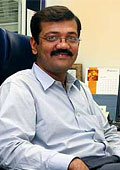 SHIRISH
RANE SHIRISH
RANE
35,
Partner
RESEARCH HOUSE: SSKI Securities
SECTORS: Cement, power, construction
and real estate
A listing of
India's best equity analysts is never complete without this 35-year-old.
Shirish Rane garnered as many votes as Prasad (that is, seven)
from the 19 fund managers that BT polled, and made the cut for
the third year in a row. Rane, who tracks sectors such as cement,
power, construction and real estate, has been doing equity research
for nearly seven years (five of them with SSKI) and, unlike Prasad,
always wanted to be an equity analyst. So after a two-year stint
with Rajan Raheja's Prism Cement and a year at CRISIL's debt rating
division, this Jamnalal Bajaj post-grad (1996 batch) jumped headlong
into equity research.
What was his best call in 2006-07? GMR Infrastructure,
pat comes the answer. "When they came out with their IPO,
people did not understand the airport infrastructure business.
Take a look at the stock today." Indeed. It has almost doubled
in the last one year. Rane is also happy about his calls on Unitech
(up 200 per cent) and Jaiprakash Associates (100 per cent), though
he says that the stock market has surprised him with its resilience
in the face of spiralling inflation and rising interest rates.
Talking specifically of the real estate sector, he says, "There
will be a few ups and downs like what we've seen over the last
year or so, but overall it's a positive story".
So, what, according to Rane, does it take
to be a good equity analyst? Besides number-crunching and communication
skills, business common sense-"something that's not so common",
quips Rane.
-T.V. Mahalingam
JESAL SHAH
34,
VP (Equity Research)
RESEARCH HOUSE: JP Morgan
SECTORS: Pharma
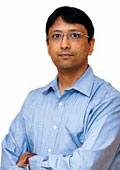 In
a world best known for its herd mentality, Jesal Shah is a contrarian.
Back in July 2005, when almost every other analyst was battering
Dr Reddy's Labs, Shah asked his clients to go 'overweight' on
the stock-that is, give it more room in their portfolios. Those
who did take his advice are laughing all their way to the bank.
The Dr Reddy's stock has more than doubled since. Similarly, he
was bearish on Cipla (in March 2006) when the D-street sentiment
was exactly the opposite on the stock. If Shah has a better feel
of pharma than other analysts it's because that's the only sector
he's tracked in the 13 years he's been in the business. "What
interests me the most about pharma is its sheer diversity of issues,
ranging from legal and scientific to strategy and regulation,"
he says. His tip to pharma investors is to look for companies
that manage growth well. If that sounds too complex, don't worry.
Just keep an eye on Shah's research reports. In
a world best known for its herd mentality, Jesal Shah is a contrarian.
Back in July 2005, when almost every other analyst was battering
Dr Reddy's Labs, Shah asked his clients to go 'overweight' on
the stock-that is, give it more room in their portfolios. Those
who did take his advice are laughing all their way to the bank.
The Dr Reddy's stock has more than doubled since. Similarly, he
was bearish on Cipla (in March 2006) when the D-street sentiment
was exactly the opposite on the stock. If Shah has a better feel
of pharma than other analysts it's because that's the only sector
he's tracked in the 13 years he's been in the business. "What
interests me the most about pharma is its sheer diversity of issues,
ranging from legal and scientific to strategy and regulation,"
he says. His tip to pharma investors is to look for companies
that manage growth well. If that sounds too complex, don't worry.
Just keep an eye on Shah's research reports.
-Krishna Gopalan
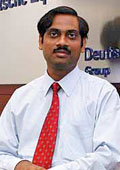 MANISH
SAXENA MANISH
SAXENA
37,
Analyst
RESEARCH HOUSE: Deutsche Securities
SECTORS: Capital goods, cement and
utilities
Unassuming'
is the word that comes to mind when you meet Manish Saxena. "I
am happy if my stock calls prove right," he says with unaffected
modesty. They usually do-at least, eventually. Like in the case
of public sector giant bhel. Last December, when there was talk
of Chinese competitors muscling into the capital goods industry
in India, Saxena put out a buy on BHEL. For a while-actually,
six weeks-it looked as if Saxena was wrong, when the stock started
moving south after it lost the contract for Sasan ultra mega power
project. But it has rebounded since, and is up 25 per cent in
just five months. "I see a lot happening in the infrastructure
sector, even as interest rates are moving upwards," says
Saxena, who joined Deutsche Securities in June last year. "The
sector will see a lot of capex coming on over the next few years."
It was a very different India when Saxena
passed out of ICFAI Business School soon after the Asian crisis
of 1997. "It was a tough period, and certainly not the best
of times to pass out," says Saxena, especially if you wanted
to make a career in equity research. So, Saxena took up a job
with the Financial Express as a corporate analyst, although prior
to his MBA he worked with Tata Steel for four years immediately
after getting a degree in electrical engineering from Mumbai's
VJTI. If there's one thing that Saxena has learnt over the years,
it is to "make money for your clients. That will make them
happy". You can't go wrong with a mantra like that.
-Krishna Gopalan
PRABHAT AWASTHI
37,
Head (Equities & Research)
RESEARCH HOUSE: BRICS Securities
SECTORS: Media and auto
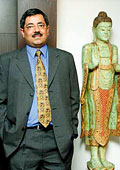 Three
years ago, when Prabhat Awasthi gave up a well-established job
at jp Morgan to join a start-up, it seemed like he was making
a bad call. While an analyst's own reputation matters a lot, that
of his research house matters as much if not more. Since then,
though, Awasthi has built BRICS from scratch and turned into a
well-regarded outfit with 13 offices in eight cities. "The
fun in working with a start-up is amazing," says the Mumbai-based
Awasthi. Investor trust is something he has earned the hard way
over the years. An engineer and IIM Lucknow alumnus, Awasthi developed
a taste for equity research while working for CRISIL back in 1994.
He moved to SSKI two years later, where he saw the "lows
in an economic cycle early on" and made a lot of sell calls
in the metals sector, which was passing through a rough patch
those days. Awasthi made a name for himself when he kept faith
in Bharti Airtel even as it fell to Rs 20 after the initial listing.
Soon, he switched to jm Morgan Stanley and then JP Morgan. "The
stint at these brokerages offered me tremendous learning,"
he says. Three
years ago, when Prabhat Awasthi gave up a well-established job
at jp Morgan to join a start-up, it seemed like he was making
a bad call. While an analyst's own reputation matters a lot, that
of his research house matters as much if not more. Since then,
though, Awasthi has built BRICS from scratch and turned into a
well-regarded outfit with 13 offices in eight cities. "The
fun in working with a start-up is amazing," says the Mumbai-based
Awasthi. Investor trust is something he has earned the hard way
over the years. An engineer and IIM Lucknow alumnus, Awasthi developed
a taste for equity research while working for CRISIL back in 1994.
He moved to SSKI two years later, where he saw the "lows
in an economic cycle early on" and made a lot of sell calls
in the metals sector, which was passing through a rough patch
those days. Awasthi made a name for himself when he kept faith
in Bharti Airtel even as it fell to Rs 20 after the initial listing.
Soon, he switched to jm Morgan Stanley and then JP Morgan. "The
stint at these brokerages offered me tremendous learning,"
he says.
Prabhat admires companies such as Reliance,
Bharti and Infosys for their entrepreneurship and growth. "Indian
companies are much more ambitious today," he says. In Awasthi's
world view, growth equals good.
-Anand Adhikari
 PRIYANKO
PANJA PRIYANKO
PANJA
33,
Vice President
RESEARCH HOUSE: Edelweiss Securities
SECTORS: Capital goods, construction
and telecom
Warren Buffett
fans would be scandalised, but Priyanko Panja thinks George Soros
is a better investor. "I love the sheer confidence of Soros,"
explains Panja. "Buffett is too long term." A strong
conviction in himself is a quality that has got Panja all the
way from a small broking firm in Kolkata to Rashesh Shah's Edelweiss
Capital in Mumbai. With degrees in cost accountancy and management,
Panja was always interested in the ups and downs of Dalal Street,
and has over the years covered sectors such as sugar, it, metals,
telecommunications, and engineering. The companies he admires
the most are Bharti Airtel, Reliance, ITC, and Infosys. He also
sees a big future for engineering companies such as L&T. "We
are paid for our conviction," says Panja, who is remembered
by fund managers for his successful calls on L&T, Tulip Software,
and Hindustan Construction in the recent past.
Yet, convincing his family, which has its
own businesses, to let him take up a job as an analyst wasn't
easy. But Panja fought to follow his own heart. "There's
no short cut to success," says Panja, who scripted a 305-page
report on infrastructure in April last year. Panja's career growth
also reflects the trajectory of his research house. Edelweiss
has been growing at 100 per cent every year for the last four,
and now intends to scale up its asset management, equity capital
and private client businesses. Panja is worried about the high
churn in the business, but says he himself can't imagine doing
anything other than divine stocks. "There are not too many
jobs where you learn every day and yet get paid well," he
says.
-Anand Adhikari
RAHUL SINGH
35,
Director-India Asia-Pacific Equity Research
RESEARCH HOUSE: Citi Investment Research
SECTORS: Telecom, oil & gas
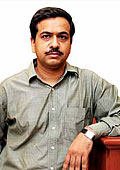 He's
back. On our list of best analysts, that is. In 2005, when Rahul
Singh debuted on our list, he was with SSKI. Now, he's with Citi
Investment Research, but continues to cover his old favourites:
telecom and oil & gas. "While the job largely remains
the same, responsibilities and clients increase with time,"
he says. An alumnus of IIT Bombay (Class of 1993, rank 5) and
IIM Lucknow (1995; rank 1), Singh's best pick to date has been
Bharti Airtel, which he put a buy on when it was at Rs 20 back
in January 2003. The stock now quotes upwards of Rs 800. What
does he look for in stocks? "For me, it is the fundamentals
of the company and the long-term outlook. I am not guided by news
flows," he explains. But he hastens to add that one cannot
ignore the short-term aspect, which means some calculated risks
need to be taken. It's a fine line to walk. But Singh, obviously,
is doing a good job of it. He's
back. On our list of best analysts, that is. In 2005, when Rahul
Singh debuted on our list, he was with SSKI. Now, he's with Citi
Investment Research, but continues to cover his old favourites:
telecom and oil & gas. "While the job largely remains
the same, responsibilities and clients increase with time,"
he says. An alumnus of IIT Bombay (Class of 1993, rank 5) and
IIM Lucknow (1995; rank 1), Singh's best pick to date has been
Bharti Airtel, which he put a buy on when it was at Rs 20 back
in January 2003. The stock now quotes upwards of Rs 800. What
does he look for in stocks? "For me, it is the fundamentals
of the company and the long-term outlook. I am not guided by news
flows," he explains. But he hastens to add that one cannot
ignore the short-term aspect, which means some calculated risks
need to be taken. It's a fine line to walk. But Singh, obviously,
is doing a good job of it.
-Anusha Subramanian
HOW WE DID IT
Like in the previous
three years, the survey was conducted among equity fund managers
of top mutual fund houses in India, with minimum assets under
management of Rs 1,000 crore. We approached 19 fund managers,
who could be either the chief investment officer or the senior-most
equity fund manager, and asked them to nominate the five best
equity analysts across research houses and sectors. The poll was
co-ordinated by BT's Mahesh Nayak. To make it to our list this
year, an analyst needed a minimum of three votes. (Last year,
the qualifying number was two, but this year we decided to increase
it to three because there were 20 analysts who got 2 or more votes.)
There were eight analysts who received 3 or more votes, but only
seven could be featured because one of them-Sameer Baisiwala of
Morgan Stanley-did not get his employer's permission to be profiled.
In terms of research houses, SSKI garnered
the maximum number of votes (12), followed by Kotak Securities
(11), and Citigroup (9). (see The Favourite List.) And in terms
of sectors, telecom and oil & gas landed the maximum votes
(15 each), followed by engineering (13), and infrastructure (11).
Consumer durables, shipping & logistics, petrochem and diversified
were sectors that received the least number of votes (1 each).
Like last year, there was a high churn among analysts, and almost
every research head said that demand for them far exceeds supply.
Given that, Business Today is grateful to the research houses
that so generously cooperated with us and gave us access to their
star analysts. It is our fond hope that this listing won't just
spotlight India's best equity analysts, but also lead to a healthy
competition among them and raise the bar in equity research.
LAST YEAR'S BEST ANALYSTS
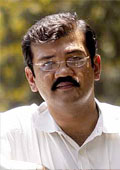 Shirish
Rane Shirish
Rane
SSKI
Mr Unshakeable, he topped our list last year with four votes,
and
this year too stays on top with seven votes. He's been on our
list for
three years now.
Abhay Laijawala
JP Morgan
The former Director of Research, Citigroup, doesn't figure
on our list this year for a simple reason: He was in transition.
He quit Citi sometime back and has just joined JP Morgan.
Ashish Gupta
CLSA
"He argues out points that other analysts may have not
even thought about," a fund manager told us last year. But
stiff competition this year has meant that CLSA's automotive and
banking analyst could not make it to our 2007 list.
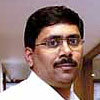 Anand
Shah Anand
Shah
I-Sec
I-Sec's well-known FMCG analyst got two votes this year that
was one short of the qualifying number this year. Don't blame
him. Blame the sector.
Satish Jain
Morgan Stanley
Here's another well-regarded analyst (from Morgan Stanley)
who did not make the cut this year.
Urmik Chhaya
Alchemy InSite
Alchemy InSite's cement and engineering analyst has been overshadowed
this year by some new names. But don't write him off, yet.
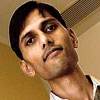 Pawan
Nahar Pawan
Nahar
Kotak Securities
Last year, this pharma analyst at Kotak was bullish on Ranbaxy;
unfortunately, investors are still wary of the stock, although
it's an excellent long-term bet.
Anirudha Dutta
CLSA
It's tough when you are a mid-cap analyst like Dutta. It's
hard to spot the next Infosys or Reliance, but that's something
fund managers, who did not vote strongly enough to put Dutta on
our list this year, expect.
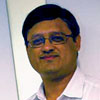 Sanjeev
Prasad Sanjeev
Prasad
Kotak Securities
Here's a man whose star is in the ascendant. Compared to two
votes last year, Prasad walked away with seven to tie with Shirish
Rane.
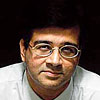 Harrish
Zaveri Harrish
Zaveri
Deutsche Equities
His is still a voice you cannot ignore, but our raising the
bar this year seems to have hurt chances of this consumer brands/retail/media
analyst at Deutsche Equities.
|





 For
Sanjeev Prasad, life hasn't changed much. he continues to be with
Kotak Securities and the fund managers' favourite-four years in
a row. And neither have things changed much for the BT reporter.
The task of generating even a 300-word profile of Prasad continues
to be a challenge-thanks to the man's shy and short replies.
For
Sanjeev Prasad, life hasn't changed much. he continues to be with
Kotak Securities and the fund managers' favourite-four years in
a row. And neither have things changed much for the BT reporter.
The task of generating even a 300-word profile of Prasad continues
to be a challenge-thanks to the man's shy and short replies.  SHIRISH
RANE
SHIRISH
RANE In
a world best known for its herd mentality, Jesal Shah is a contrarian.
Back in July 2005, when almost every other analyst was battering
Dr Reddy's Labs, Shah asked his clients to go 'overweight' on
the stock-that is, give it more room in their portfolios. Those
who did take his advice are laughing all their way to the bank.
The Dr Reddy's stock has more than doubled since. Similarly, he
was bearish on Cipla (in March 2006) when the D-street sentiment
was exactly the opposite on the stock. If Shah has a better feel
of pharma than other analysts it's because that's the only sector
he's tracked in the 13 years he's been in the business. "What
interests me the most about pharma is its sheer diversity of issues,
ranging from legal and scientific to strategy and regulation,"
he says. His tip to pharma investors is to look for companies
that manage growth well. If that sounds too complex, don't worry.
Just keep an eye on Shah's research reports.
In
a world best known for its herd mentality, Jesal Shah is a contrarian.
Back in July 2005, when almost every other analyst was battering
Dr Reddy's Labs, Shah asked his clients to go 'overweight' on
the stock-that is, give it more room in their portfolios. Those
who did take his advice are laughing all their way to the bank.
The Dr Reddy's stock has more than doubled since. Similarly, he
was bearish on Cipla (in March 2006) when the D-street sentiment
was exactly the opposite on the stock. If Shah has a better feel
of pharma than other analysts it's because that's the only sector
he's tracked in the 13 years he's been in the business. "What
interests me the most about pharma is its sheer diversity of issues,
ranging from legal and scientific to strategy and regulation,"
he says. His tip to pharma investors is to look for companies
that manage growth well. If that sounds too complex, don't worry.
Just keep an eye on Shah's research reports. MANISH
SAXENA
MANISH
SAXENA  Three
years ago, when Prabhat Awasthi gave up a well-established job
at jp Morgan to join a start-up, it seemed like he was making
a bad call. While an analyst's own reputation matters a lot, that
of his research house matters as much if not more. Since then,
though, Awasthi has built BRICS from scratch and turned into a
well-regarded outfit with 13 offices in eight cities. "The
fun in working with a start-up is amazing," says the Mumbai-based
Awasthi. Investor trust is something he has earned the hard way
over the years. An engineer and IIM Lucknow alumnus, Awasthi developed
a taste for equity research while working for CRISIL back in 1994.
He moved to SSKI two years later, where he saw the "lows
in an economic cycle early on" and made a lot of sell calls
in the metals sector, which was passing through a rough patch
those days. Awasthi made a name for himself when he kept faith
in Bharti Airtel even as it fell to Rs 20 after the initial listing.
Soon, he switched to jm Morgan Stanley and then JP Morgan. "The
stint at these brokerages offered me tremendous learning,"
he says.
Three
years ago, when Prabhat Awasthi gave up a well-established job
at jp Morgan to join a start-up, it seemed like he was making
a bad call. While an analyst's own reputation matters a lot, that
of his research house matters as much if not more. Since then,
though, Awasthi has built BRICS from scratch and turned into a
well-regarded outfit with 13 offices in eight cities. "The
fun in working with a start-up is amazing," says the Mumbai-based
Awasthi. Investor trust is something he has earned the hard way
over the years. An engineer and IIM Lucknow alumnus, Awasthi developed
a taste for equity research while working for CRISIL back in 1994.
He moved to SSKI two years later, where he saw the "lows
in an economic cycle early on" and made a lot of sell calls
in the metals sector, which was passing through a rough patch
those days. Awasthi made a name for himself when he kept faith
in Bharti Airtel even as it fell to Rs 20 after the initial listing.
Soon, he switched to jm Morgan Stanley and then JP Morgan. "The
stint at these brokerages offered me tremendous learning,"
he says.  PRIYANKO
PANJA
PRIYANKO
PANJA He's
back. On our list of best analysts, that is. In 2005, when Rahul
Singh debuted on our list, he was with SSKI. Now, he's with Citi
Investment Research, but continues to cover his old favourites:
telecom and oil & gas. "While the job largely remains
the same, responsibilities and clients increase with time,"
he says. An alumnus of IIT Bombay (Class of 1993, rank 5) and
IIM Lucknow (1995; rank 1), Singh's best pick to date has been
Bharti Airtel, which he put a buy on when it was at Rs 20 back
in January 2003. The stock now quotes upwards of Rs 800. What
does he look for in stocks? "For me, it is the fundamentals
of the company and the long-term outlook. I am not guided by news
flows," he explains. But he hastens to add that one cannot
ignore the short-term aspect, which means some calculated risks
need to be taken. It's a fine line to walk. But Singh, obviously,
is doing a good job of it.
He's
back. On our list of best analysts, that is. In 2005, when Rahul
Singh debuted on our list, he was with SSKI. Now, he's with Citi
Investment Research, but continues to cover his old favourites:
telecom and oil & gas. "While the job largely remains
the same, responsibilities and clients increase with time,"
he says. An alumnus of IIT Bombay (Class of 1993, rank 5) and
IIM Lucknow (1995; rank 1), Singh's best pick to date has been
Bharti Airtel, which he put a buy on when it was at Rs 20 back
in January 2003. The stock now quotes upwards of Rs 800. What
does he look for in stocks? "For me, it is the fundamentals
of the company and the long-term outlook. I am not guided by news
flows," he explains. But he hastens to add that one cannot
ignore the short-term aspect, which means some calculated risks
need to be taken. It's a fine line to walk. But Singh, obviously,
is doing a good job of it. Shirish
Rane
Shirish
Rane Anand
Shah
Anand
Shah Pawan
Nahar
Pawan
Nahar Sanjeev
Prasad
Sanjeev
Prasad Harrish
Zaveri
Harrish
Zaveri